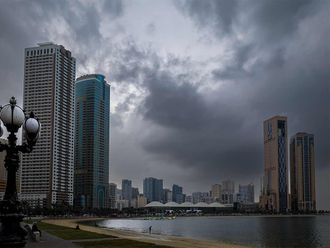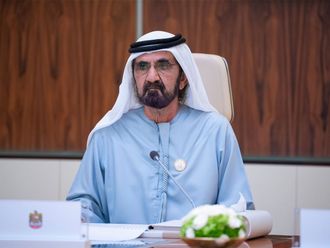
New York: The UAE has supported Millennium Declaration (MDG) based on its firm
conviction that the implementation of the MDG is a main factor in the maintenance
of peace, security and prosperity in the world, said UAE State Minister Reem
Ebrahim Al Hashimi, here on Tuesday at the high level plenary meeting of the
General assembly, on assessment of the Millennium Summit.
"Today, we renew our support of the Declaration and affirm our intention to
continue working towards achieving the MDG by the year 2015 as we pledged, she
added while speaking at the High Level Plenary Meeting of the General Assembly on
Follow-up to the outcome of the Millennium Summit", she added.
The UAE minister congratulated Switzerland, on behalf of the United Arab Emirates
delegation, for its election as a president of the General Assembly at its 65th
session.
The recent international economic, financial and security conditions prevailing
during the last few years have demonstrated how interlinked the interests and
concerns of countries of the world are. The economic crises aftermath proved that
no country is safe from its impact regardless to the distances or the economic
differences.
The UAE strongly believes that success in achieving the MDGS
requires an effective global partnership within the frame work of the
recommendations of the Millennium Declaration and other conferences on
development, especially the Monterey Consensus and the Doha Declaration on
Financing for Development.
"And while we recognise that the global economic and financial crisis led to the
recession of the national incomes of developed donor countries, we urge those
countries not to withdraw their commitments and keep working towards achieving
the 0.7 per cent of their gross national income as official development
assistance for the developing countries; take effective steps towards alleviating
or canceling their debts, and provide them with the new technology to help them
build enabling environment for sustainable development", she said.
The UAE official emphasised the importance of reforming the international
economic, financial and trade systems so as to allow the developing countries the
opportunity to participate in the international market in a just and equitable
manner. "In the same time, we urge the developing countries to adopt economic
policies that encourage production and help attract foreign investment."
The UAE minister noted that her country succeeded in containing the aftermath of
the economic crises so as not to impact its achievements in the development
process and fall back from commitments and foreign aid contributions for
development. "Our successes in achieving the Millennium Development Goals on the
national level, allowed us to enhance our contributions in the global partnership
to assist developing countries achieve the development goals as soon as possible.
We have exploited the revenue of oil to expand and diversify sources of national
income and focus on the human development."
She underscored that "We were able in a short period of time to achieve total
eradication of poverty, raise the average income per capita to the highest levels
in the world, and achieve gender equality and women empowerment. In the same time
we ensured the sustainability of the environment, mitigation the effects of
climate change and reduced emissions." She cited that the Masdar Initiative for
renewable energy, which was launched in Abu Dhabi in 2007, is considered the
first of its kind in the region and a big step towards investing in renewable
energy and reducing the levels of carbon dioxide to the lowest possible level.
The UAE believes in the high value of human life and in the
importance of protecting and developing it and providing a dignified source of
living for very human being wherever he is. Standing on these principles,
Reem noted the UAE has adopted a foreign policy that focuses on
cooperation and bilateral and international partnerships to achieve development
in other countries. The UAE is one of the major donors in the international
partnership for development. A number of national institutions and funds
participate in the foreign aid contributions, which forms a high percentage of
the gross national income of our country.
"These contributions are provided as ODA for around 100 developing countries in
various continents. 95 per cent of that assistance is given as grants while the
rest goes in the form of loans. About 80 per cent of these contributions are
directed to major development projects in those countries. For instance the
Khalifa bin Zayed Al Nahyan Foundation, founded in 2007 by President His Highness Shaikh Khalifa Bin Zayed Al Nahyan, provides relief and development
assistance to developing countries and effected countries by natural disasters
and conflicts, as well as financing development projects in more than 45
countries in Asia, Africa and Europe", she said.
Reem added that the Dubai Care Initiative founded by His Highness Shaikh Mohammad Bin Rashid Al Maktoum, Vice President and Prime Minister and Ruler of Dubai, works to
provide primary education for 4 million children in 14 developing countries to
fight poverty and empower them, within the frame work of the MDGs.
The UAE official said this year the United Arab Emirates launched the Pacific
Programme Programme in February 2010 with an initial capital of $50 million,
solely dedicated to the provision of funding for projects and initiatives
focusing on the Pacific island nations in a wide-range of developmental fields,
such as education, health and social services, infrastructure and projects in
renewable energy.
The UAE plays an effective role in strengthening the international assistance in
cases of emergency, such as natural disasters and armed conflicts. In 2009 the
UAE has donated around 3 billion dollars as humanitarian and development
assistance, with special focus on countries most affected.
She concluded that the UAE reaffirms its commitment to strengthen the
international partnership to expedite the implementation of the MDGs, calling for
the intensification of the international efforts to deal with the underlying
causes and challenges that hinder the achievement of the goals on time, and to
find effective solutions for them.











